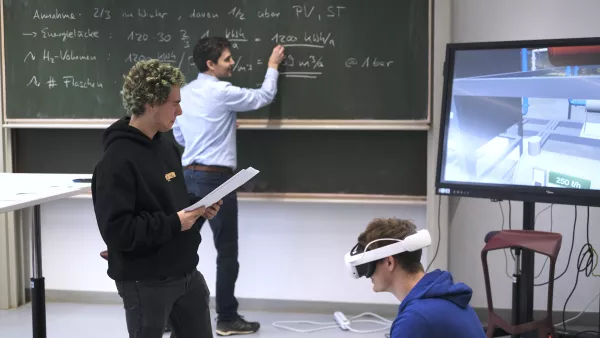
An important step towards future-oriented education, teaching and research has been taken in the Immersive Learning Lab at RWU's Didactics Center: the first student test run of the virtual electrolysis plant was carried out. Two students were able to immerse themselves in the virtual reality (VR) system for around two and a half hours and were simultaneously given tasks by Professor Dr. Christoph Ziegler. The team was accompanied and supported by Markus Rossa, Head of Immersive Learning Lab.
The virtual electrolysis plant for the production of hydrogen was jointly developed by Christoph Ziegler, Head of the bachelor's degree program in Energy and Environmental Engineering, and Alexander Lanz, Immersive Learning Developer and member of the University Didactics Team. The project was funded as part of the Fellowship Program of the Stifterverband and the Ministry of Science, Research and the Arts with the aim of supporting digital university teaching and (further) developing digital teaching concepts.
Immersive learning with virtual and augmented reality
The Immersive Learning Lab at RWU is a state-of-the-art educational space for learning and teaching. Equipped with the latest technologies in virtual and augmented reality, it offers a unique teaching and learning environment. Here, students can experience and interactively operate complex technical systems, such as the electrolysis plant, in a fully simulated environment. In addition, lectures can also be held in the VR Audimax, allowing students to develop their presentation skills.
The Students Maximilian Bosch and Mattis Leisner, who took part in this first test run, were confronted with realistic scenarios and practical tasks. This enabled them to understand and practise the operation and management of the electrolysis plant. The tasks ranged from monitoring and controlling the plant to troubleshooting and optimizing processes. During the run-through, the participants repeatedly switched between different media: In addition to the VR glasses, these included a 75-inch screen and a classic whiteboard. Christoph Ziegler used the latter to further calculate the results measured in VR. The constant switching and the intermediality were "particularly important and valuable from a didactic point of view", summarized Markus Rossa.
Future-oriented teaching
"This project is a milestone in the practical, virtual education of our students at RWU," continued Markus Rossa. "We enable students to learn complex technical concepts in a secure and controllable environment," added Alexander Lanz. Christoph Ziegler pointed out another major advantage: "A real electrolysis plant like this would neither be affordable nor feasible for us in a real laboratory."
The students responded enthusiastically to this innovative teaching method. "It all looks so real and tangible." "It's really fun," commented Maximilian Bosch and Mattis Leisner their 'technical' trip into the virtual world. In the realistic simulation, the two were able to apply and deepen their theoretical knowledge and effectively put their practical skills into practice. They also gained insights into future fields of activity and real-life requirements in the industry.
Cross-institutional collaboration
The Immersive Learning Lab sees the electrolysis plant and the didactic concept developed for it as an ideal example of how this technology can enhance everyday learning in the future. Above all, the theory-practice transfer of students can be realized even more comprehensively and realistically through these learning experiences. The successful test run of the virtual electrolysis plant, including validation of the didactic concept, is an important milestone in establishing this innovative learning method. From the summer semester of 2024, students of the bachelor's degree programs Energy and Environmental Engineering as well as E-Mobility and Green Energy will gradually complete their first laboratory practicals in virtual reality.